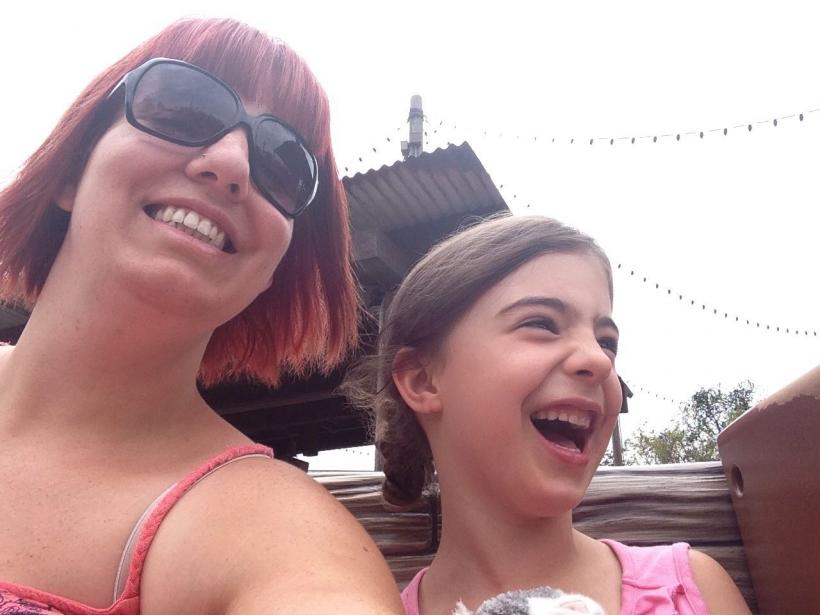
It began like it usually does—not noticeable to anyone else, but I saw the signs. A little squeak. Hands pulled up to her face. Her body moving frenetically, as if powered by an inner, malfunctioning switch suddenly flipped to high.
Her older sister said something to her, or maybe just looked at her, and that was enough. She began to roar, scream, bang her head. The sounds emitting from her mouth alternated between guttural and ear-splittingly high-pitched. I tried to speak to her, but that only made it worse. She looked at me with the eyes of a caged animal, crawled away to huddle into a corner, and screamed louder. There was nothing left to do but wait it out. Nearly 30 minutes later, my nerves frazzled and my teeth grinding subconsciously, it was over. She began crying, came to me for a hug, then ran off to play.
This is autism in my house. Not high functioning. Not low functioning. Just middle of the road autism. Autism that weaves its threads through the tapestry of our household. Autism that is always there, waiting to assert itself. Autism that is the furthest thing from a gift that I can imagine.
 I do not hate my daughter's autism anymore. I did for awhile, earlier in our journey. I hated it for stealing bits and pieces of her. I hated it for bringing her pain from simple things like crowded rooms and tags on clothing. I hated it for diminishing her ability to share her remarkable self with others. I even hated it for the strain and work it brought me, from coping with diet change and meltdowns to juggling therapies and IEP meetings.
I do not hate my daughter's autism anymore. I did for awhile, earlier in our journey. I hated it for stealing bits and pieces of her. I hated it for bringing her pain from simple things like crowded rooms and tags on clothing. I hated it for diminishing her ability to share her remarkable self with others. I even hated it for the strain and work it brought me, from coping with diet change and meltdowns to juggling therapies and IEP meetings.
I made my peace with autism because it seemed like the best choice I had in the face of an unchangeable diagnosis. Instead of fighting against it, I have done my best to accept it. I watch her struggle and try to remain detached enough to wait out the meltdown and be there with a hug at the end. But I simply can't accept it as just another variation of normal. Or, worse yet, "neurodiversity" to be celebrated.
I've never been normal, really. I was born without fingers on one hand. I suffer from mitochondrial disease, a genetic illness that has left me disabled in my 30s. I understand that these things aren't "normal," and I don't need them to be in order to feel valued. I do not believe that my self-worth is found in my fingers or my genes, and I have no trouble reconciling the fact that I am both abnormal and worthwhile.
Perhaps this is why I simply do not understand the push for autism to be considered just another variation of normal. Or something to be merely accepted, without searching for treatment, prevention, or even a cure. Autism is a neuro-developmental disorder that may have a multitude of different causes; my friend's sons, for example, have autism due to a genetic alteration that my daughter doesn't have. These causes are directly the result of abnormalities—so why has it become taboo in many autism circles to suggest that autism is a disorder that merits searching for prevention or a cure? Instead, we are told that we should simply love and accept our children for who they are, not seek answers.
I've struggled to reconcile these ideas with my experience of raising two children on the autism spectrum. While my oldest son has Aspergers, and might just become a very dedicated computer programmer someday, my daughter can currently only attend school half days with the assistance of an aide. She is not a misunderstood genius who happens to be a little socially awkward. She is a child whose brain misfires seemingly without reason, who can cover her ears and scream in sensory pain three rooms away from the sound of an elevator ding, and who will turn her entire body away from a toddler complimenting her princess dress. She is also an astonishingly creative and expressive artist, who has the deepest relationship with her cat that you will ever see. She is both crushingly disabled by autism and absolutely, emphatically her own self. She is a gift, that much is true. But her autism, like my missing fingers or my damaged DNA, is not. 
Last year, my oldest son and I met Temple Grandin, who encouraged parents to enroll their children in therapies. She even credited them with her own progress. Her recommendations spanned the gamut from B vitamins to sensory swings to sunglasses and after-school jobs. Yet time and again, I encounter parents of children with autism and even autism awareness organizations that seek to shame parents for attempting to improve their children's functioning. Or, more maddening still, "heartwarming" inspirational articles reminding us that autism is a gift.
It's a beautiful idea, this rhetoric about autism as something to be cherished. It creates a facade of acceptance and tolerance that makes everyone feel good about themselves. After all, we all know someone with autism. Now we can pat ourselves on the back for how open-minded we are. And there is nothing but good that can come from learning to accept and tolerate people who are different from us—whether we are talking about autism or not. But here's the thing: Opening minds and hearts to autism will only remove some ignorant interactions and obstacles from our path. It will not ease sensory pain or gastrointestinal problems. It will not dissolve speech delays or improve social functioning. It will not eradicate the need for accommodations for my daughter to attend school.
Acceptance of autism is a valuable step in the process, as it helps remove the stigma surrounding being different. It leads us, as a society, further from judgment and closer to compassion. But when autism is viewed as just another variation of neurological function, it has the potential to limit or even eliminate access to research, therapies, and desperately-needed accommodations for children with autism. It sacrifices real-world needs for feel-good romanticized ideals. And it ostracizes parents who are doing the best they can for their children.
It's okay to be different. It's okay to have health problems. It's even okay to have special needs. If the only way that we can accept our children is to seek to normalize them, perhaps it's time to ask ourselves why we only value "normal" children. It isn't a sign of love to deny your child's differences, and it isn't a sign of weakness not to glorify them.








![Photo By Dr. François S. Clemmons [CC BY-SA 4.0 (https://creativecommons.org/licenses/by-sa/4.0)], from Wikimedia Commons](/sites/default/files/styles/profile/public/images/article/2019-06/Mr.%2520Rogers%2520%25281%2529.png?itok=LLdrwTAP)